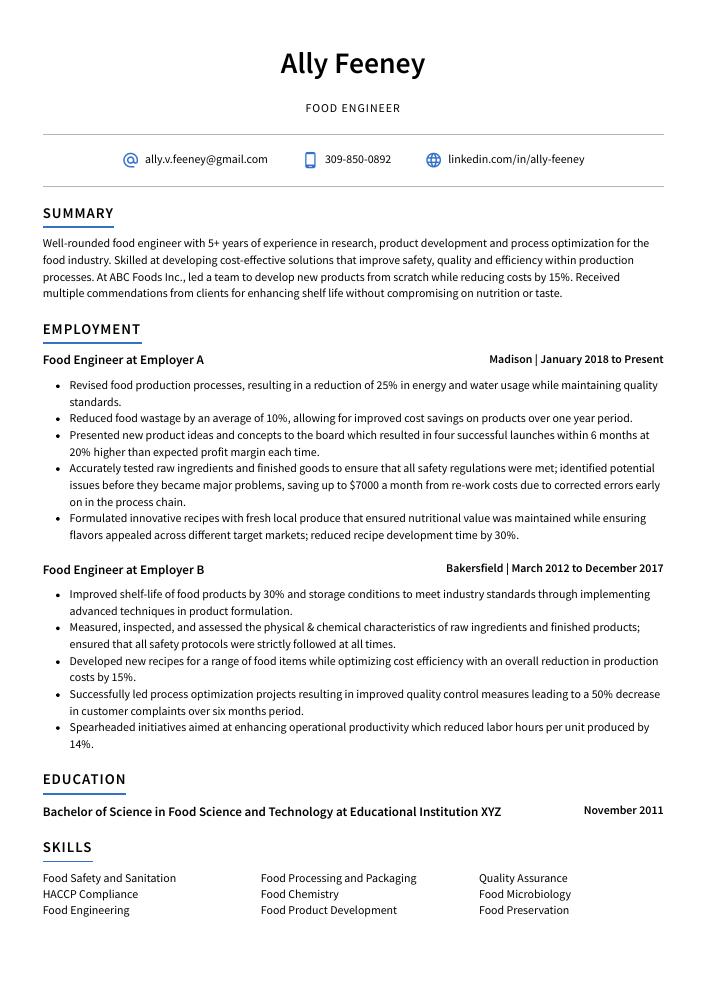Food Engineer Resume Guide
Food engineers design, develop and manufacture food products. They use their knowledge of chemistry, biology and engineering to create new recipes that meet the needs of consumers while following safety regulations. They also optimize existing processes to improve efficiency in production facilities.
You have a knack for creating delicious dishes and experimenting with new flavors. To get the attention of potential employers, you must create an eye-catching resume that highlights your culinary expertise.
This guide will walk you through the entire process of creating a top-notch resume. We first show you a complete example and then break down what each resume section should look like.
Table of Contents
The guide is divided into sections for your convenience. You can read it from beginning to end or use the table of contents below to jump to a specific part.
Food Engineer Resume Sample
Ally Feeney
Food Engineer
[email protected]
309-850-0892
linkedin.com/in/ally-feeney
Summary
Well-rounded food engineer with 5+ years of experience in research, product development and process optimization for the food industry. Skilled at developing cost-effective solutions that improve safety, quality and efficiency within production processes. At ABC Foods Inc., led a team to develop new products from scratch while reducing costs by 15%. Received multiple commendations from clients for enhancing shelf life without compromising on nutrition or taste.
Experience
Food Engineer, Employer A
Madison, Jan 2018 – Present
- Revised food production processes, resulting in a reduction of 25% in energy and water usage while maintaining quality standards.
- Reduced food wastage by an average of 10%, allowing for improved cost savings on products over one year period.
- Presented new product ideas and concepts to the board which resulted in four successful launches within 6 months at 20% higher than expected profit margin each time.
- Accurately tested raw ingredients and finished goods to ensure that all safety regulations were met; identified potential issues before they became major problems, saving up to $7000 a month from re-work costs due to corrected errors early on in the process chain.
- Formulated innovative recipes with fresh local produce that ensured nutritional value was maintained while ensuring flavors appealed across different target markets; reduced recipe development time by 30%.
Food Engineer, Employer B
Bakersfield, Mar 2012 – Dec 2017
- Improved shelf-life of food products by 30% and storage conditions to meet industry standards through implementing advanced techniques in product formulation.
- Measured, inspected, and assessed the physical & chemical characteristics of raw ingredients and finished products; ensured that all safety protocols were strictly followed at all times.
- Developed new recipes for a range of food items while optimizing cost efficiency with an overall reduction in production costs by 15%.
- Successfully led process optimization projects resulting in improved quality control measures leading to a 50% decrease in customer complaints over six months period.
- Spearheaded initiatives aimed at enhancing operational productivity which reduced labor hours per unit produced by 14%.
Skills
- Food Safety and Sanitation
- Food Processing and Packaging
- Quality Assurance
- HACCP Compliance
- Food Chemistry
- Food Microbiology
- Food Engineering
- Food Product Development
- Food Preservation
Education
Bachelor of Science in Food Science and Technology
Educational Institution XYZ
Nov 2011
Certifications
Certified Food Scientist
Institute of Food Technologists
May 2017
1. Summary / Objective
Your resume summary/objective should be an enticing overview of your qualifications as a food engineer. This is where you can highlight the most impressive aspects of your experience and skillset, such as the innovative recipes you have developed, the number of years in product development or quality assurance roles, and any certifications that make you stand out from other candidates.
Below are some resume summary examples:
Driven food engineer with experience in developing and manufacturing food products for large-scale production. Proven ability to optimize the process from conception through delivery, ensuring that all products meet customer requirements while maximizing cost savings. At XYZ Foods, developed over 40 new recipes for various product lines leading to a 7% increase in revenue. Experienced with project management and quality assurance procedures.
Seasoned food engineer with 5+ years of experience in the food processing industry. Skilled in product development, process optimization and quality control management. Proven success improving efficiency by 15% through creative problem solving and data-driven decision making. Seeking to join ABC Foods as a Senior Food Engineer to create innovative products that meet customer needs while adhering to regulations.
Diligent food engineer with extensive experience in research and development for food processing industry. At XYZ, developed a new process to reduce spoilage by 20%. Proven track record of developing innovative packaging solutions that increased shelf-life without compromising quality or safety standards. Experienced in working with multiple vendors to ensure cost-effectiveness while meeting customer demands.
Talented and creative food engineer with 6+ years of experience in the food industry. Skilled at creating innovative and cost-effective recipes for large scale production, while maintaining high quality standards. Seeking to join ABC Food Company to utilize knowledge of ingredients, nutrition facts and product development processes to create delicious products that will delight consumers.
Determined and knowledgeable food engineer with 5+ years of experience in developing and improving processes for large-scale production facilities. At XYZ, created a new system to reduce waste by 20% while increasing efficiency by 25%. Skilled at troubleshooting equipment problems and optimizing existing systems. Adept at creating cost-saving solutions that adhere to safety standards.
Skilled food engineer with 4+ years of experience in the development and implementation of food production processes. Successfully developed 8 new products for XYZ, leading to a 15% year-over-year increase in sales revenue. Looking to join ABC Tech as a Food Engineer to use my expertise in product innovation, process optimization, and regulatory compliance for continued success.
Passionate food engineer with 5+ years of experience in food production, engineering and optimization. Seeking to join ABC Food Production as a full-time food engineer to utilize my expertise in improving processes, product quality and customer satisfaction while reducing costs. Successfully implemented several process improvement initiatives that increased efficiency by 20%.
Professional food engineer with 10+ years of experience in product development and process optimization. Expertise in designing products to meet a range of nutritional, safety, and regulatory standards while optimizing cost-efficiency. Seeking to use knowledge and skills at ABC Foods to develop innovative food solutions that will improve the lives of people around the world.
2. Experience / Employment
In the experience/employment/work history section, you should list your past jobs in reverse chronological order, with the most recent one at the top.
When writing about what you did in each job, use bullet points to keep it concise and easy to read. You want to provide detail on what tasks you were responsible for and any successes or results achieved.
For example, instead of saying “Developed new food products,” try something like this: “Created 10+ innovative food products that met all safety standards while delivering a unique flavor profile; resulted in an increase of 20% in sales within six months.”
To write effective bullet points, begin with a strong verb or adverb. Industry specific verbs to use are:
- Formulated
- Optimized
- Processed
- Monitored
- Inspected
- Packaged
- Blended
- Tested
- Analyzed
- Measured
- Stored
- Prepared
- Cooked
- Sanitized
- Labeled
Other general verbs you can use are:
- Achieved
- Advised
- Assessed
- Compiled
- Coordinated
- Demonstrated
- Developed
- Expedited
- Facilitated
- Improved
- Introduced
- Mentored
- Participated
- Presented
- Reduced
- Reorganized
- Represented
- Revised
- Spearheaded
- Streamlined
- Structured
- Utilized
Below are some example bullet points:
- Prepared and implemented food engineering plans to increase production efficiency by 25%, while reducing waste and increasing profits by $6,000.
- Tested and monitored the quality of raw materials used in food processing, utilizing state-of-the-art instruments such as gas chromatographs and pH meters; reduced contamination incidents from 8% to 3%.
- Structured an effective food engineering system for a leading manufacturing plant that enabled it to produce over 200 products within 6 months; also automated packaging processes resulting in +20 minutes of time savings per product cycle.
- Resourcefully designed an innovative heat transfer mechanism which significantly improved the heating process of frozen foods without compromising on taste or texture – saving up to 10 hours during each batch run.
- Achieved certification as a Certified Food Engineer (CFE) through State University with exemplary grades after completing rigorous academic courses involving physical chemistry & thermodynamics principles applied in industrial settings.
- Expedited design, testing and production of new food products to market in 6 months or less; improved customer satisfaction ratings by 5%.
- Utilized advanced engineering principles when developing innovative recipes for various types of foods including frozen entrées, sauces, condiments and confectionery items.
- Efficiently managed the sourcing of ingredients from approved vendors while maintaining quality assurance standards at all times; reduced ingredient cost per unit by 12%.
- Labeled finished product packaging with accurate nutritional content information according to industry regulations; increased safety compliance rating by 10%.
- Stored raw materials as well as intermediate goods in temperature-controlled environments to preserve freshness and shelf life; minimized spoilage losses during transit and storage operations by 20%.
- Blended ingredients and spices to formulate flavors for 30+ food products, resulting in a 5% increase in sales.
- Mentored junior engineers on the principles of food engineering and ensured compliance with industry regulations; developed training program that decreased safety violations by 15%.
- Optimized recipes to reduce production costs while maintaining product quality; achieved savings of $5,000 per month within one year.
- Coordinated efforts between multiple departments such as purchasing, packaging & logistics to ensure timely delivery of finished goods; improved turnaround time by 10 hours each week on average.
- Reliably monitored processes related to sterilization, preservation and shelf-life extension during production cycles resulting in reduced waste levels by 20%.
- Spearheaded the development of new food products, testing and analyzing their physical properties to ensure that they met industry standards; reduced research time by 15%.
- Monitored production processes for various food items with an emphasis on safety and quality control protocols; increased product shelf life by an average of 20 days per item.
- Independently designed optimized packaging solutions that preserved the freshness of foods while reducing overall shipping costs by $2,500/month.
- Demonstrated excellent problem-solving skills when troubleshooting deficiencies in machinery or refining existing recipes for improved flavor & texture profiles across all products produced in the factory.
- Introduced a number of cost-saving initiatives including automated batch tracking systems which decreased raw material wastage rates by 23%.
- Processed over 3,000 tons of food products per month while adhering to strict industry and safety regulations; reduced waste levels by 16%.
- Facilitated the development of 20+ innovative food products, from concept to launch in under 6 months; increased product sales revenue by $4 million.
- Actively monitored various stages of production for 150+ SKUs using advanced machinery and equipment; successfully maintained a 99% quality standard on all final products produced.
- Compiled detailed reports regarding process engineering operations such as material consumption, energy usage & costs associated with each project managed per week; identified areas for improvement which resulted in cost savings up to 15%.
- Cooked batches of experimental foods according to precise recipes and instructions utilizing specialized laboratory tools like pH meters and temperature probes with high accuracy rates (+/- 0.05%).
- Represented the company in numerous industry conferences and seminars, delivering presentations on food engineering innovations to over 500 attendees.
- Streamlined production processes for 10+ products by optimizing factory layout and introducing automated equipment, resulting in a 20% increase in operational efficiency.
- Reorganized machinery operations across three factories located within the same region; reduced downtime by 15 hours per week with improved workflow management techniques.
- Analyzed existing packaging materials used to store food items and developed cost-effective alternatives that lowered costs by $10,000 annually while maintaining quality standards at all times.
- Proficiently scaled up recipes from laboratory scale batches to commercial volumes of 200+ kgs/hour without compromising ingredient or flavor profiles; increased yield rates by 5%.
- Participated in the development of over 25 innovative food products, increasing sales by 20% and improving customer satisfaction.
- Advised production teams on efficient ways to improve processes and reduce waste; sanitized equipment regularly ensuring safety standards were met.
- Sanitized all ingredients used in production lines according to established health protocols; reduced contamination cases by 30%.
- Confidently created recipes for a variety of desserts, entrees, appetizers and side dishes that were both healthy and delicious; successfully tested 10+ new products for market release within 6 months’ time frame.
- Developed custom packaging solutions for dairy-free alternatives that extended shelf life up to 2 weeks without compromising flavor or texture characteristics; saved costs equivalent to $10K per month on average every year since implementation start date.
3. Skills
Skill requirements will differ from employer to employer – this can easily be determined via the job advert. Organization ABC may require the candidate to be proficient in food safety regulations, while Organization XYZ may need them to have a good understanding of product development.
It is important that you tailor your skills section accordingly as many employers use applicant tracking systems these days, which are computer programs that scan resumes for certain keywords before passing them on to a human.
Once listed here, it’s also wise to discuss your most relevant qualifications and abilities in more detail elsewhere; such as within the summary or experience sections.
Below is a list of common skills & terms:
- Food Chemistry
- Food Engineering
- Food Microbiology
- Food Preservation
- Food Processing and Packaging
- Food Product Development
- Food Safety and Sanitation
- HACCP Compliance
- Nutrition and Health
- Quality Assurance
4. Education
Mentioning an education section on your resume will depend on how far along you are in your career. If you just graduated and have no work experience, it is important to include an education section below your professional summary or objective. However, if you have significant work experience that showcases the skills relevant to a food engineer role, omitting this part might be better for highlighting what’s most important about yourself as a job candidate.
If including an education section, make sure to mention courses related to food engineering and any other qualifications that may help set you apart from other applicants.
Bachelor of Science in Food Science and Technology
Educational Institution XYZ
Nov 2011
5. Certifications
Certifications are a great way to demonstrate your expertise in a particular field. They can be especially beneficial if the job you are applying for requires specific skills or qualifications.
Including certifications on your resume will show potential employers that you have taken the initiative to learn and develop yourself professionally, which is always an attractive quality in any candidate. Make sure to list all relevant certifications, as well as their issuing body and date of completion so hiring managers know exactly what they’re looking at.
Certified Food Scientist
Institute of Food Technologists
May 2017
6. Contact Info
Your name should be the first thing a reader sees when viewing your resume, so ensure its positioning is prominent. Your phone number should be written in the most commonly used format in your country/city/state, and your email address should be professional.
You can also choose to include a link to your LinkedIn profile, personal website, or other online platforms relevant to your industry.
Finally, name your resume file appropriately to help hiring managers; for Ally Feeney, this would be Ally-Feeney-resume.pdf or Ally-Feeney-resume.docx.
7. Cover Letter
Submitting a cover letter with your job application is an effective way to make a good first impression. It should be written in 2-4 paragraphs and provide further insight into who you are as a professional.
Cover letters allow you to showcase why you’re the ideal candidate for the role, what makes you unique, and how your skillset will benefit the company if hired. Although not always necessary, writing one can give recruiters more information about yourself that isn’t included on your resume.
Below is an example cover letter:
Dear Rebekah,
I am writing to apply for your food engineer opening. With experience in both the public and private sector, I have a diverse range of skills that would benefit your organization. In my current role as a food scientist with the USDA, I develop new ways to process and preserve foods while maintaining their nutritional value. I have also worked as a quality control manager for a large food manufacturer, where I was responsible for ensuring that all products met safety and quality standards.
My experience has taught me how to think outside the box to solve problems and develop innovative solutions. In my most recent project, I led a team of scientists in developing a new method of canning fruits and vegetables that reduced processing time by 30%. This not only saved the company money, but also resulted in less waste and fewer damaged goods.
I am confident that I can bring my knowledge and expertise to your organization and contribute to its success. I look forward to speaking with you about this opportunity soon. Thank you for your time and consideration.
Sincerely,
Ally
Food Engineer Resume Templates
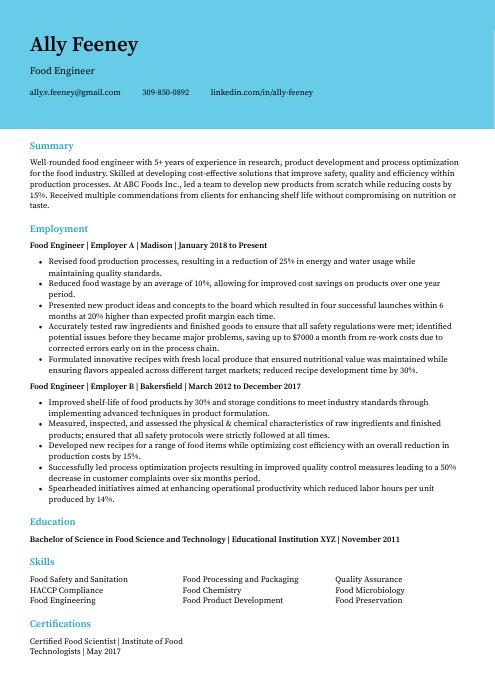 Dugong
Dugong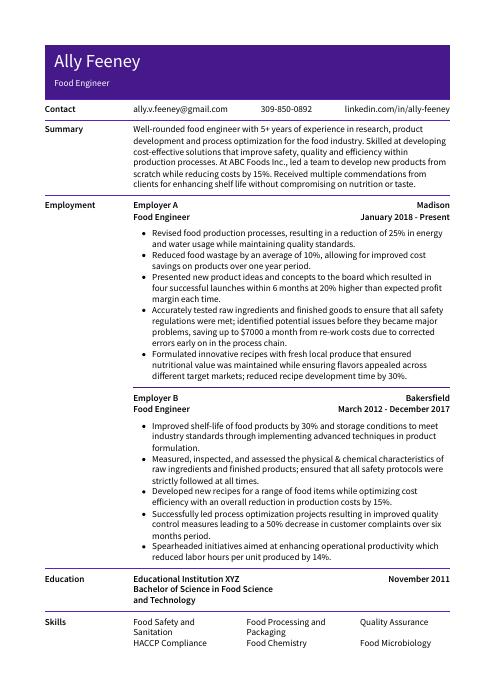 Pika
Pika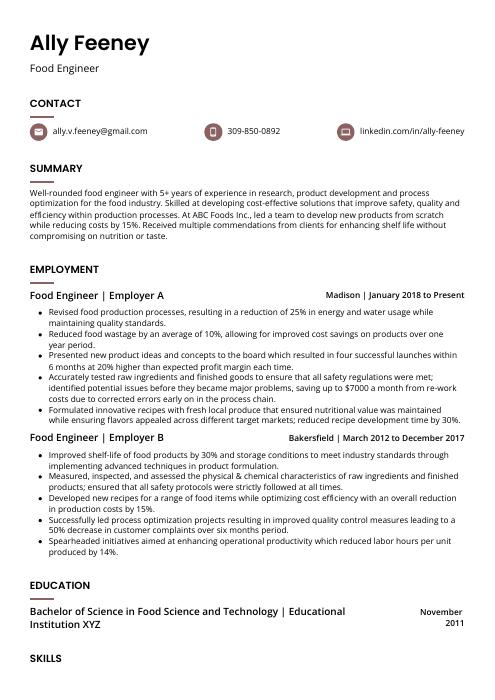 Fossa
Fossa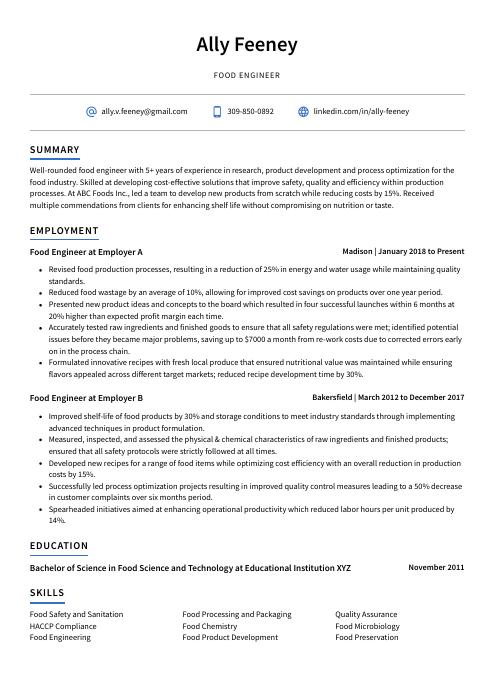 Axolotl
Axolotl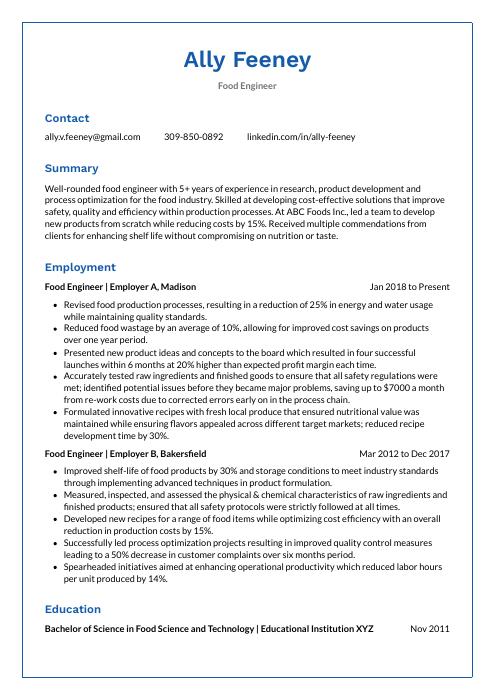 Markhor
Markhor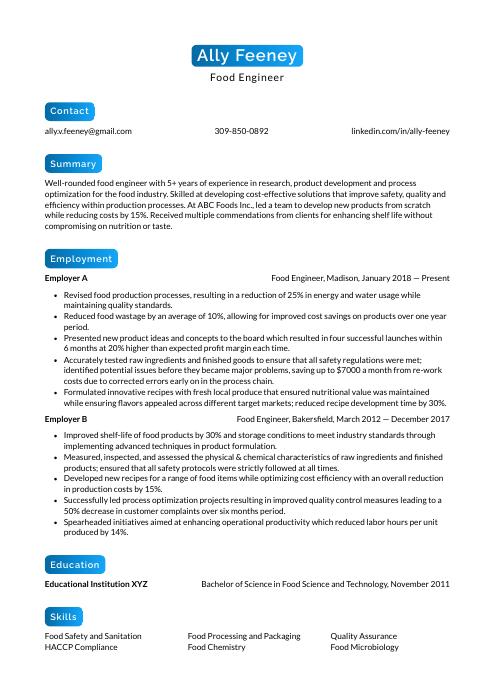 Kinkajou
Kinkajou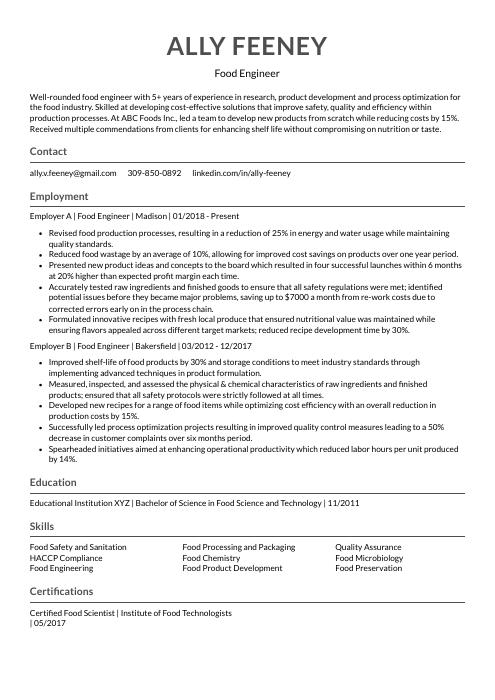 Indri
Indri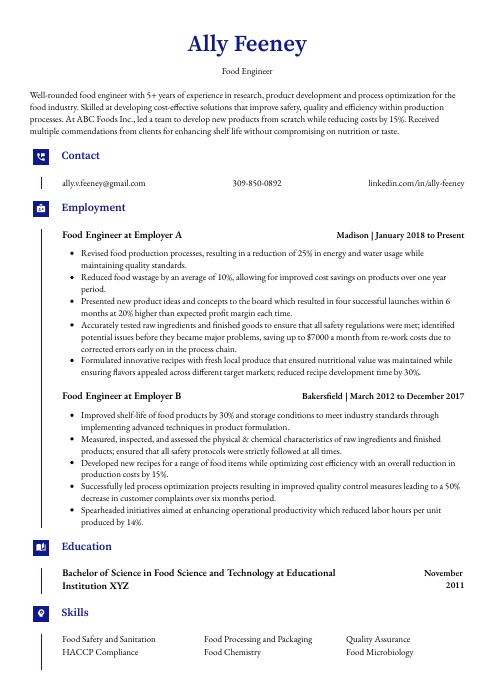 Gharial
Gharial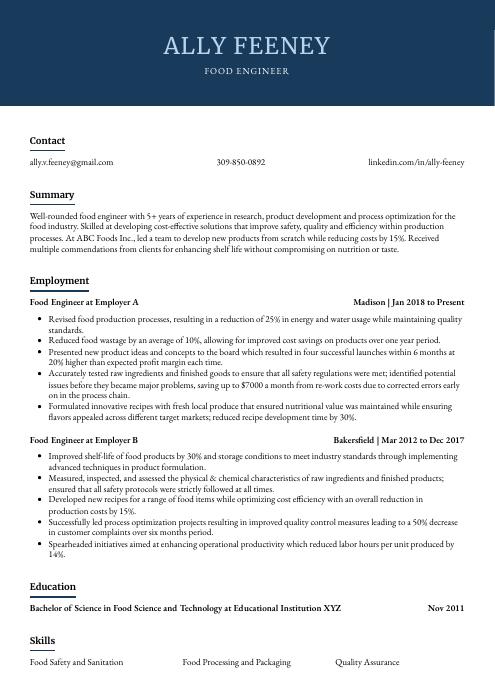 Bonobo
Bonobo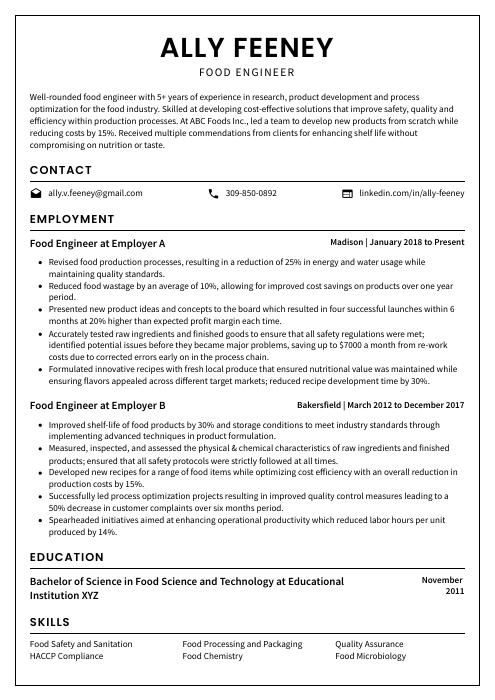 Cormorant
Cormorant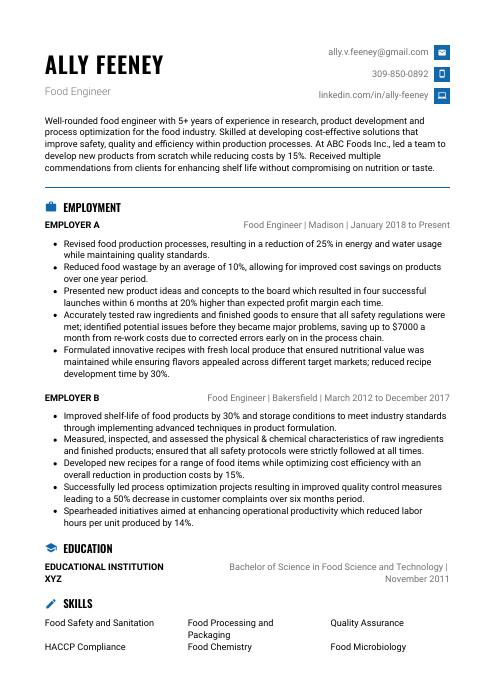 Echidna
Echidna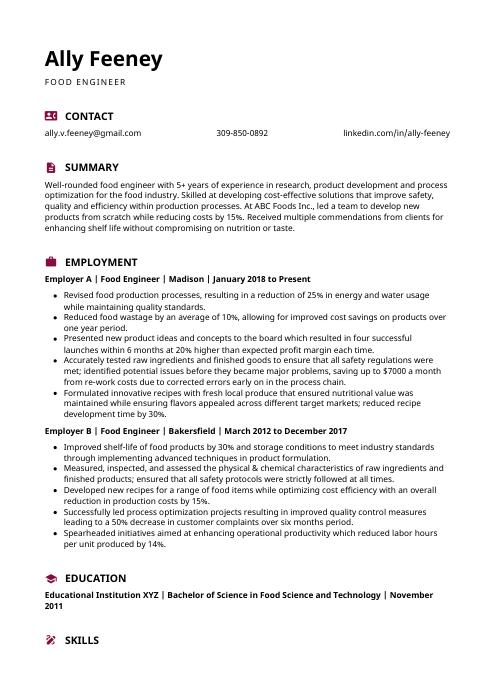 Hoopoe
Hoopoe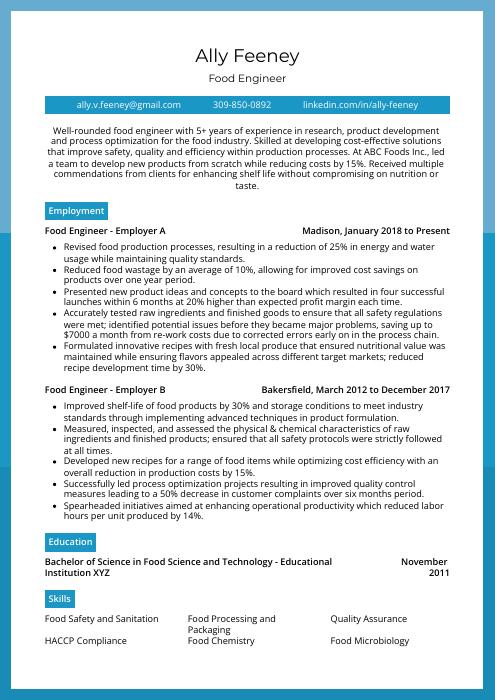 Rhea
Rhea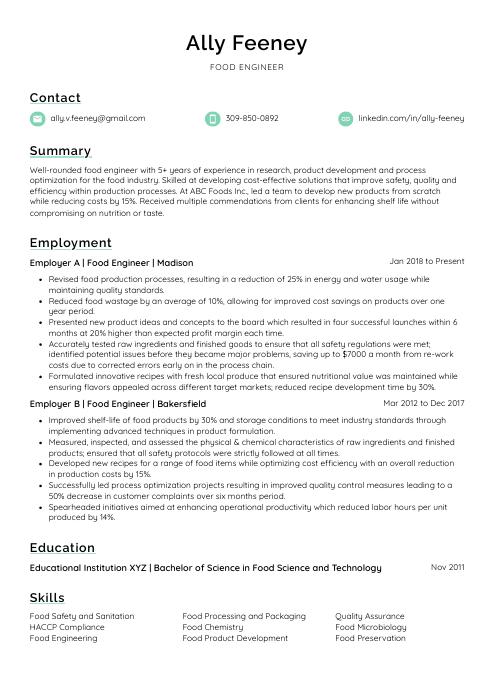 Lorikeet
Lorikeet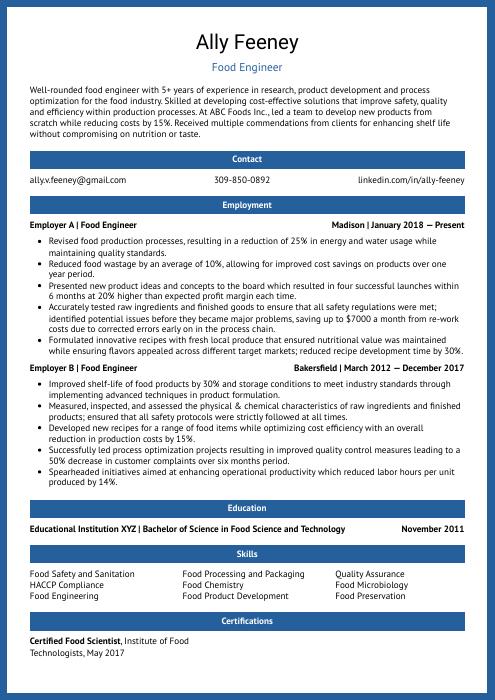 Ocelot
Ocelot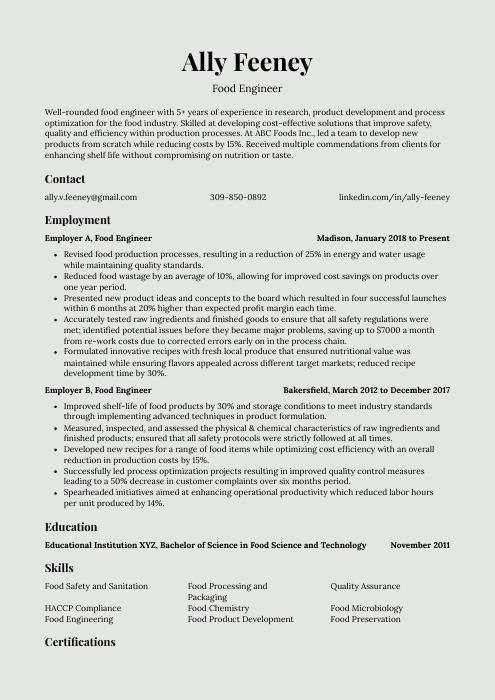 Saola
Saola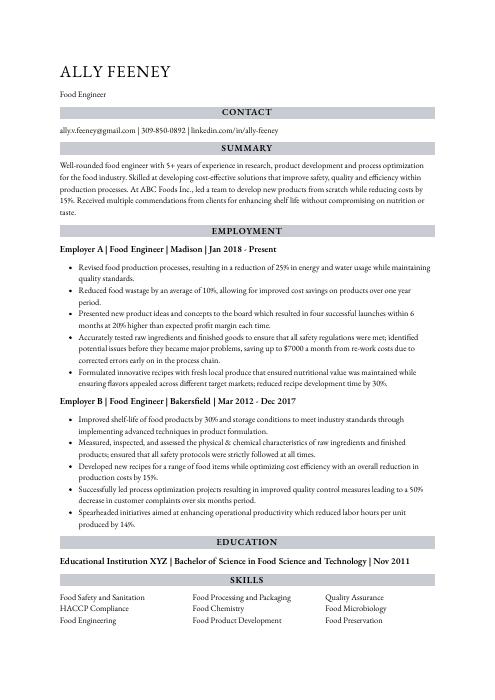 Numbat
Numbat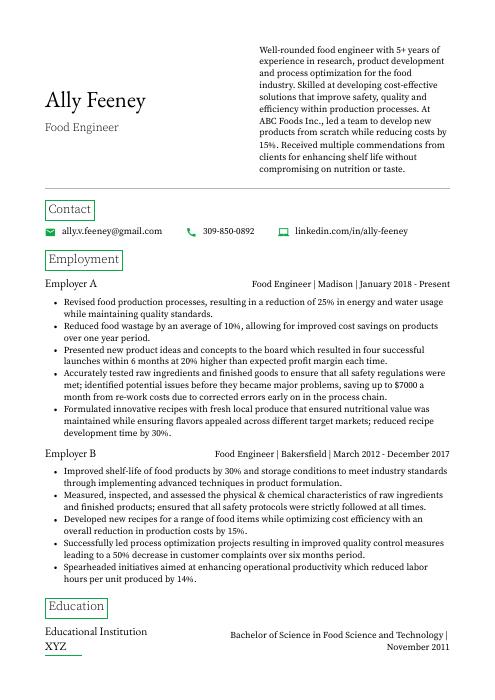 Quokka
Quokka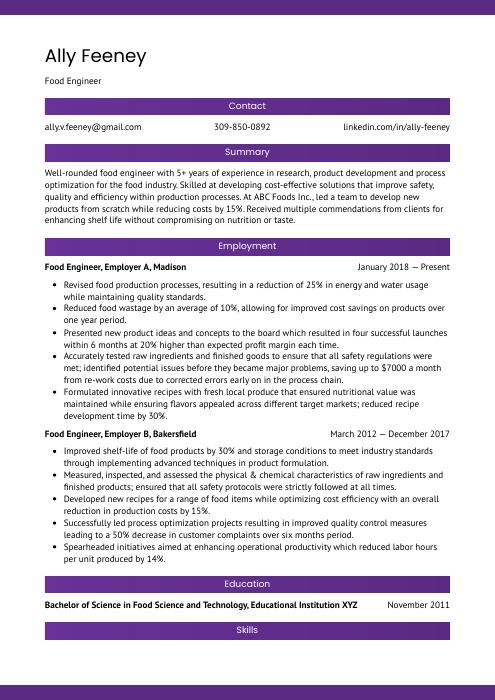 Jerboa
Jerboa Rezjumei
Rezjumei
